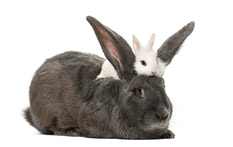Desexing
Desexing, also called spaying or neutering, is performed for reasons of both health and safety. For male and female animals it can reduce the risk of a range of issues such as cancer, reproductive and urinary tract infections and territoriality. Desexing usually reduces aggressive behaviours in dogs which in turn promotes more positive social interactions.
|
Dogs and cats may be desexed from 5.5 months of age (rabbits sooner), before sexual maturity is reached.
We can desex pets at any age, and large and giant breed dogs may benefit if the procedure is delayed until they are around 12 months of age. The optimum time for your pet should be discussed with the Veterinarian. Desexings, and other elective procedures such as dentals, are conducted Monday to Friday. Patients are admitted between 7:30 and 8am on the day of the procedure. They should be fasted from midnight (not rabbits) but water may be provided up to the time of admission. Patients are generally discharged with the vet in attendance between 5 and 6pm. Surgical patients are prescribed an Elizabethan collar as an essential part of post operative care. |

